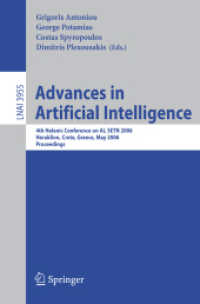- ホーム
- > 洋書
- > 英文書
- > Literary Criticism
Full Description
This first book-length study of fictional suicides in East German literature provides insight into the complex and dynamic rhetoric of the GDR and the literariness of its literature.
The many fictional suicides in the literature of the German Democratic Republic have been greatly misunderstood. The common assumption is that authoritarian oppression in East Germany led to an anomalous abundance of real suicides, so that fictional suicides in GDR literature constitute a simple, realistic reflection of East German society. Robert Blankenship challenges this assumption by providing both a history of suicide in GDR literature and close readings of individual texts, revealing that suicides in GDR literature, rather than simply reflecting historical suicides, contain rich literary attributes such as intertextuality, haunting, epistolarity, and unorthodox narrative strategies. Such literariness offered subversive potential beyond suggesting that real people killed themselves in a communist country. This first book-length study of fictional suicides in East German literature provides insight into the complex and dynamic rhetoric of the GDR. Blankenship's underlying claim is that GDR literature ought to be read as literature, with literary methodology, not despite the country's politically and rhetorically charged nature,but precisely because of it. Suicide in East German Literature will be of interest to scholars of GDR literature, humanities-oriented scholars of suicide, and those who are interested in the complex relationship between literature and history.
Robert Blankenship is Assistant Professor of German at California State University, Long Beach.
Contents
Introduction: The Rhetoric of Suicide in East Germany
Suicide as an Anti-Fascist Literary Trope: 1945-71
Suicide and the Fluidity of Literary Heritage: Ulrich Plenzdorf's Die neuen Leiden des jungen W.
Remembering to Death: Werner Heiduczek's Tod am Meer
Suicide and the Reevaluation of Classicism: Christa Wolf's Kein Ort. Nirgends
Suicidal Voices: Heiner Müller's Hamletmaschine and Sibylle Muthesius's Flucht in die Wolken
Specters of Suicide: Christoph Hein's Horns Ende
Conclusion: The Reality of Fictional Suicides
Epilogue: The Literariness of East German Literature
Notes
Bibliography
Index







